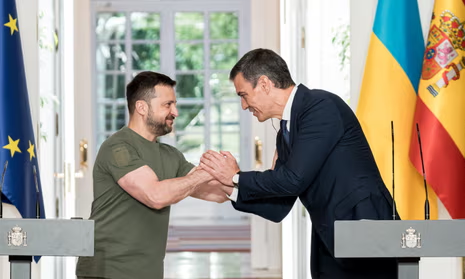On his recent visit to Spain, Ukrainian leader Volodymyr Zelensky urged Western leaders to provoke Russia into settling for peace talks using ‘all means’ necessary. Speaking at the La Monclova palace in a joint conference with Spain’s Prime Minister Pedro Sanchez, Mr Zelensky said there needed to be a “tangible coercion of Russia” which was seeking to “destroy Ukraine and move on.” He reiterated his refusal to negotiate with Russia until all forces leave Ukrainian territory, including Crimea. These statements emerge amidst increasing Russian gains against Ukraine with Ukraine suffering from a shortage of Western Supplied weapons.

Spain announces military aid for Ukraine
Volodymyr Zelensky visited Spain to sign an important and decade long defense and security deal, which included a $1 billion package from Spain. Although the details of the agreement have not been released in the public domain, the Prime Minister of Spain told the press that this aid would help Ukraine boost its military capacities, including its air defenses to protect its citizens, cities and infrastructure. The deal was originally planned to be signed earlier in the month but had to be postponed due to the Kremlin’s cross border offensive in the Kharkiv region.
Recent developments in the war
As the war entered its 822nd day, Mr Zelensky claimed that Russian forces had dropped about 3,200 guided aerial bombs on Ukraine this month alone and due to a lack of air defense supplies, Ukraine could not counter this large-scale attack. He appealed to the Western nations to lift bans on weapons being used to strike internationally recognised Russian territory. “We need to work together and put pressure not only on Russia, but also on our partners to give us the opportunity to defend ourselves against Russia.” The United States and other western allies have insisted that Ukraine limit its attack only to Russian forces that occupy Ukrainian territory, suggesting their hesitance to be dragged deeper into the conflict.
The Peace Summit In Switzerland
The Ukrainian leader also rejected the idea of inviting Russia to the planned peace summit in the Swiss city of Lucerne on the 15th and 16th of June. The summit which aims to put diplomatic pressure on Vladimir Putin will involve charting a plan for lasting peace in Ukraine based on Zelensky’s 10 point peace plan. The plan includes reparation payment for war-related damages, the return of invaded territory and a special tribunal to prosecute Russian War Crimes. Around 160 delegations have been invited for the summit according to the Swiss government.
Zelensky’s appeal to international allies
Developments over the past 18 months indicate that Russia is enjoying a clear advantage without much compromise as its soldiers capture and retain Ukrainian territory. In the context of previously failed ceasefires and Russia’s insistence on capturing the whole country, Ukraine is feeling the brunt of decreased relevance as the world focuses its attention elsewhere.
The upcoming summit in Switzerland is a clear indication of Mr Zelensky’s urgency to accumulate international support in the hope that larger participation in the summit would amount to increased pressure on the Kremlin. Moreover Mr Zelensky’s resumption of international travel also displays his effort to combat war fatigue and to collect humanitarian aid. However, it is instances like Spain’s generous military aid that signify that Mr Zelensky’s diplomatic tactics may still reap results.


